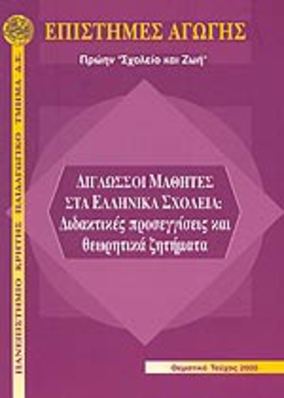Ο καθρέπτης της Δύσεως : δημόσιοι λόγοι κατά τη συγκρότηση του νεοελληνικού κράτους, 1833-62: λόγοι πανεπιστημιακών και εμπόρων
Part of : Επιστήμες Αγωγής ; No.1, 2011, pages 21-45
Issue:
Pages:
21-45
Abstract:
This article examines the power relations within the Greek State during its formation. More specifically, it examines the assimilation of the Western standard as an element in constructing these power and social hierarchies.The study has as a starting point some conclusions, which are established within historiography: a) the West, as being both the standard and the reality, was present throughout the entire process of the Greek as well as of all other Balkan states' formation; b) the terms "Europe", "enlightened nations", "material and intellectual culture" were detached from any reality and referred to established and generally accepted concepts and contexts; c) even though the negative or positive connotations of the "West" as a concept remained diverse throughout this period, this concept preserved its functionality intact as an esteemed standard of imitation.The article, to continue with, turns towards investigating two social groups, who participate in the possession of different but equally important capital: university professors and tradesmen. More specifically, it investigates the Discourses of university professors and Europeanized tradesmen, who, with their symbolic and operative power, and without claiming unconventionality, tried to shape the similarities from which a Greek collective consciousness would arise, based on the unity between Nation and Monarchy. The article does not simply recover the «representations» of western reality within these Discourses, which are anyway known and widely researched, when it comes to their generality and vagueness. It predominantly a) codifies selected ideologies under the pattern of widely accepted concepts; b) examines their symbolic application as the only and legitimate definition of society; c) examines the mechanisms of assimilating and spreading these ideologies from the elite groups that proclaim them, as well as other social groups who receive them.Lastly, the article points out the outcomes resulting from the "operation" of such Discourses. Mainly that: a) the Monarch and the state mechanisms gain the intellectual tools, which unify their symbolic power with the nation-state they longed to form; b) the agents of these Discourses, university professors and tradesmen, established their "western" character and therefore their role and status within the state apparatus that was coming into being; c) using a formal non-vernacular language (Katharevousa) as the vehicle, both university professors and tradesmen contribute in creating: a language of authority; A new and constantly enhanced political vocabulary; New terms for addressing and reference, metaphors and euphemisms for society; terminology that becomes established via its repetition and, as it gradually becomes incorporated in the wider social groups, it creates a collective consciousness under the protection of the symbolic power of the State; d) the Discourses about the West were transformed into Discourses of Action, to contribute, to a considerable extent, into formulating conventional standards, embraced by the Monarchy. At the same time, these Discourses would be in favor of this "collective consciousness" to be exclusively monopolized by the authorities, who already had the monopoly anyway, and would exclude all the rest who did not had the means to gain it.
Subject (LC):
Keywords:
βασιλεία Όθωνος, πολιτικές αρχηγεσίες, καθηγητές πανεπιστημίου και έμποροι, δημόσιοι λόγοι, τελετές και συμβολισμοί, κωδικοποίηση ιδεολογιών, κατασκευή λόγου αυθεντίας, συμβολική επιβολή, η Δύση ως πρότυπο
Notes:
Περιέχει βιβλιογραφία, Διατίθεται εικόνα του πρωτοκόλλου της ενωπίου του βασιλέως Όθωνος ορκωμοσίας των πρώτων καθηγητών του Εθνικού Πανεπιστημίου




